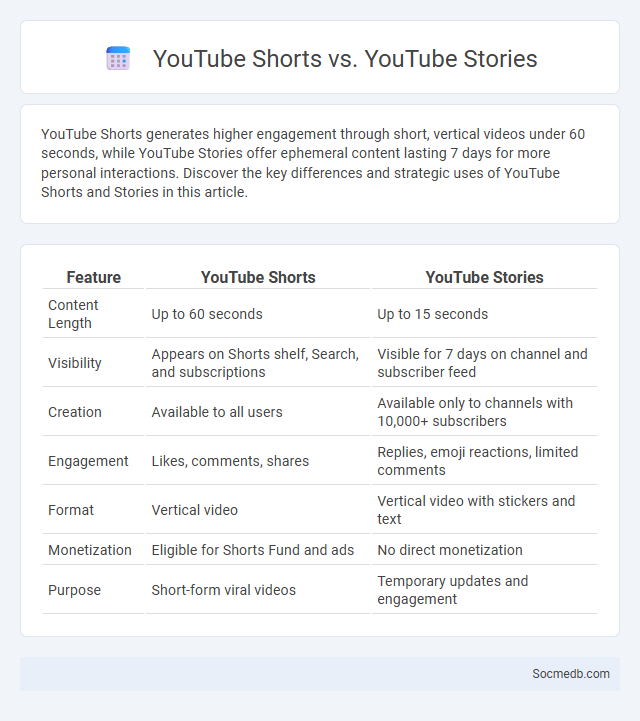
Photo illustration: YouTube Shorts vs YouTube Stories
YouTube Shorts generates higher engagement through short, vertical videos under 60 seconds, while YouTube Stories offer ephemeral content lasting 7 days for more personal interactions. Discover the key differences and strategic uses of YouTube Shorts and Stories in this article.
Table of Comparison
| Feature | YouTube Shorts | YouTube Stories |
|---|---|---|
| Content Length | Up to 60 seconds | Up to 15 seconds |
| Visibility | Appears on Shorts shelf, Search, and subscriptions | Visible for 7 days on channel and subscriber feed |
| Creation | Available to all users | Available only to channels with 10,000+ subscribers |
| Engagement | Likes, comments, shares | Replies, emoji reactions, limited comments |
| Format | Vertical video | Vertical video with stickers and text |
| Monetization | Eligible for Shorts Fund and ads | No direct monetization |
| Purpose | Short-form viral videos | Temporary updates and engagement |
Introduction: Understanding YouTube’s Short-Form Content
YouTube's short-form content, known as YouTube Shorts, offers a dynamic platform for quick, engaging videos under 60 seconds, designed to capture viewers' attention rapidly. With billions of daily views globally, Shorts enable creators to boost visibility and connect with diverse audiences through trending challenges and concise storytelling. Your ability to leverage these bite-sized videos can significantly enhance your social media presence and drive increased engagement.
What Are YouTube Shorts?
YouTube Shorts are vertical videos up to 60 seconds long designed for mobile viewing, enabling creators to quickly share bite-sized content. These short-form videos appear in a dedicated Shorts shelf on the YouTube app, increasing visibility and engagement for creators. YouTube Shorts integrate features like music, speed controls, and text tools to enhance video creativity and viewer interaction.
What Are YouTube Stories?
YouTube Stories are short, vertical videos designed for creators to share engaging, behind-the-scenes moments or quick updates with their audience. These ephemeral clips disappear after seven days, encouraging timely content and frequent interaction. YouTube Stories enhance user engagement by providing a native platform for spontaneous, authentic communication within the YouTube ecosystem.
Key Features: Shorts vs Stories
Shorts offer your content a chance to go viral with their algorithm-driven exposure and unlimited playback potential, typically lasting up to 60 seconds. Stories provide a temporary, engaging way to share moments that disappear after 24 hours, with interactive elements like polls and stickers to boost viewer interaction. Choosing Shorts or Stories depends on whether you want long-term reach through searchable videos or fleeting, personal connections with your audience.
Audience Engagement: Which Performs Better?
Audience engagement on social media varies depending on the platform, with Instagram and TikTok often outperforming others in terms of interaction rates due to their visual and video-centric content formats. Your content is more likely to perform better on platforms that prioritize algorithms favoring user interaction, such as Instagram Stories, Reels, and TikTok's For You Page. Tailoring your strategy to include interactive elements like polls, questions, and live videos can significantly boost your engagement metrics.
Content Creation Process: Shorts vs Stories
Creating engaging content for social media requires understanding the unique formats of shorts and stories. Shorts leverage concise, impactful videos often optimized for quick engagement and algorithmic reach, ideal for brand awareness and viral potential. Your content strategy should balance the immediate, replayable nature of shorts with the ephemeral, authentic storytelling value that stories provide to foster closer audience connections.
Visibility and Algorithm Differences
Social media visibility depends heavily on platform-specific algorithms that prioritize content based on user engagement, relevance, and recency. Facebook's algorithm emphasizes meaningful interactions, while Instagram prioritizes content with high engagement rates and timely posts. Twitter's timeline showcases content based on recency and user preferences, impacting the organic reach and visibility of posts across platforms.
Monetization Opportunities
Social media platforms offer diverse monetization opportunities through targeted advertising, influencer partnerships, and subscription-based models. Creators can leverage sponsored content, affiliate marketing, and direct fan support to generate revenue. Brands benefit from data-driven marketing strategies that optimize audience engagement and conversion rates.
Pros and Cons of YouTube Shorts and Stories
YouTube Shorts offers creators rapid exposure through short, engaging videos, boosting channel growth and viewer interaction, while its algorithm promotes high discoverability. However, Shorts' limited video length restricts deep content creation, and the emphasis on quick views may reduce overall viewer retention. YouTube Stories enable personal connection and real-time updates, enhancing audience engagement, yet they vanish after seven days, limiting long-term content value and reach.
Choosing the Best Format for Your Channel
Selecting the optimal social media format depends on platform algorithms, audience behavior, and content objectives. Video content performs exceptionally well on platforms like TikTok and Instagram Reels, boosting engagement rates by up to 80%, while infographics and images are ideal for Facebook and Pinterest audiences seeking quick insights. Analyzing user demographics and engagement metrics can ensure your content format aligns with channel-specific preferences, maximizing reach and interaction.
 socmedb.com
socmedb.com